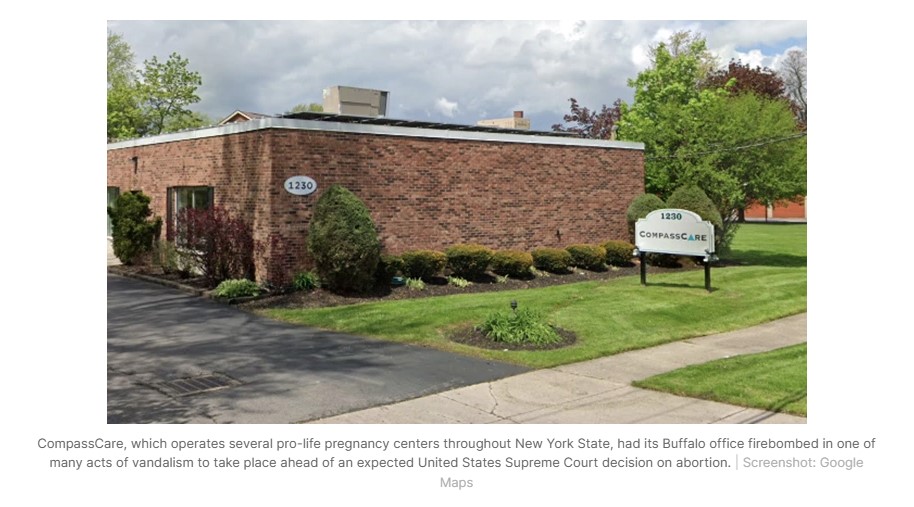
Appeals court revives challenge to New York law restricting religious groups’ hiring practices
By: Ryan Foley, originally published January 3, 2025, The Christian Post
A federal appellate court has revived a challenge brought by pro-life organizations and a church against a New York law they say prevents faith-based employers from taking action against employees who undergo abortions.
A three-judge panel on the 2nd U.S. Circuit Court of Appeals released the opinion Thursday siding with the pro-life pregnancy care center network CompassCare, the National Institute of Family and Life Advocates and First Bible Baptist Church in their lawsuit against state officials.
The relevant portion of New York Labor Law Section 203-e prohibits employers from engaging in “discrimination based on an employee’s or a dependent’s reproductive health decision making.”
Judge Thomas McAvoy of the U.S. District Court for the Northern District of New York dismissed the claim from the plaintiffs that the law violated the faith-based employers’ rights to expressive-association under the First Amendment to the U.S. Constitution. However, the 2nd Circuit ruled that the claim had merit and the lawsuit could continue.
The district court ruling was issued in 2020, before the 2nd Circuit sided with Evergreen Association, a pro-life pregnancy center, in the 2023 decision Slattery v. Hochul.
In Slattery, the 2nd Circuit reversed a lower court’s dismissal of the organization’s assertion that the law violated its freedom of expressive association and remanded it to the U.S. District Court for the Northern District of New York for further proceedings.
“The District Court did not have the benefit of the Slattery opinion — which is now binding precedent — when it issued the orders challenged in this matter,” Judge Sarah Merriam wrote in Thursday’s opinion. “In light of Slattery, we vacate the dismissal of Plaintiffs’ expressive-association claim.”

The law in question prohibits employers from “accessing an employee’s personal information regarding the employee’s … reproductive health decision making, including but not limited to, the decision to use or access a particular drug, device or medical service,” the opinion said. All three plaintiff organizations require employees to abide by statements of faith denouncing abortion, viewing employees’ adherence to their core beliefs as central to their mission.
In Slattery, the 2nd Circuit determined that the plaintiff may have a valid claim against the law if it can prove that “[t]he statute forces Evergreen to employ individuals who act or have acted against the very mission of its organization,” setting a bar that successful challenges to the law will have to clear.
In Thursday’s opinion, Merriam stressed that “each Plaintiff will have to demonstrate that it meets the relevant standard separately and independently of the others — the outcome may therefore vary for different Plaintiffs.”
In Slattery, the 2nd Circuit determined that the plaintiff may have a valid claim against the law if it can prove that “[t]he statute forces Evergreen to employ individuals who act or have acted against the very mission of its organization,” setting a bar that successful challenges to the law will have to clear.
In Thursday’s opinion, Merriam stressed that “each Plaintiff will have to demonstrate that it meets the relevant standard separately and independently of the others — the outcome may therefore vary for different Plaintiffs.”
Alliance Defending Freedom, the legal organization representing the plaintiffs, maintains that the law requires “employers — including churches, religious schools, faith-based pregnancy care centers, and religious nonprofits — to undermine their own beliefs about abortion, contraception, and sexual morality by forcing them to employ those who cannot effectively convey the groups’ message because they refuse to abide by the organizations’ statements of faith and core principles about such issues.”
ADF Senior Counsel Kevin Theriot issued a statement Thursday praising the development.
“Our nation has long respected the rights of religious organizations to associate with like-minded believers, and the court’s decision rightly reinstates our clients’ claim seeking to affirm that this right protects employment practices affecting the groups’ mission,” he said.
“Religious employers are free to hire individuals who share their core beliefs, and no government can force faith-based organizations to contradict those convictions,” Theriot added. “The 2nd Circuit was right to revive this challenge, allowing our clients to defend their constitutionally protected freedom to join with others and express what they believe without fear of government punishment or coercion.”
Ryan Foley is a reporter for The Christian Post.
